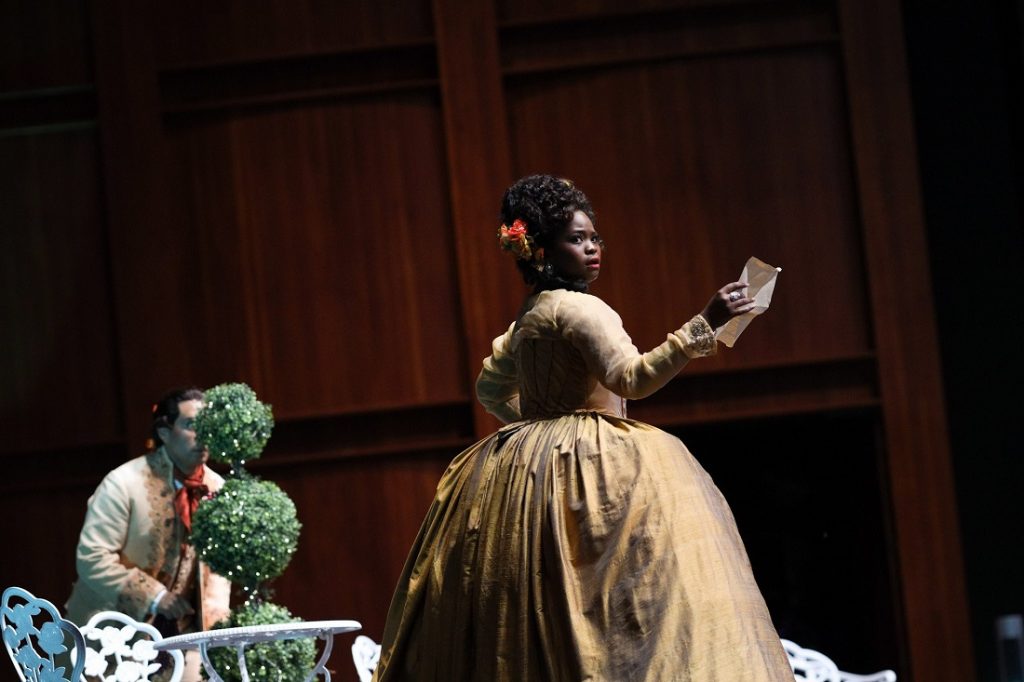Wolf Trap Opera and NSO revive forgotten, fizzy French work

Ricardo Garcia and Chanáe Curtis starred in “L’Amant Anonyme” Friday night at Wolf Trap (Photo: A.E. Landes)
Composers who were women or people of color have often faced prejudice, limiting their careers while living and their fame after death. The National Symphony Orchestra continued to spotlight the work of one such composer, Joseph Bologne, on Friday evening. Singers from Wolf Trap Opera Company took to the boards in the Filene Center for a semi-staged concert performance of the Afro-French composer’s lone surviving complete opera, L’Amant Anonyme.
Social distancing guidelines kept the audience small in number, but many spectators and orchestral musicians went maskless, the closest a Washington venue has gotten to pre-pandemic conditions.
Later known as the Chevalier de Saint-Georges, Joseph Bologne (1745-1799) was born on the island of Guadeloupe, to a wealthy French planter and an enslaved 16-year-old girl. Legitimated by his father, Bologne was educated in France, becoming renowned both as a fencer and violinist. His music was admired by many other composers, including Mozart, who was a guest in the same nobleman’s home as Bologne, following Mozart’s mother’s death in Paris in 1778.
Bologne penned two opéras comiques around that time, which had unsuccessful premieres at the Comédie Italienne. According to a biography by Gabriel Banat, Bologne’s fame as an orchestra conductor led to him being proposed to head the troubled Paris Opéra. The candidacy was scuttled by a petition from three of the company’s female stars, who claimed “that their honor and delicate conscience could never allow them to submit to the orders of a [person of mixed race].”
Bologne was hired instead as music director for Madame de Montesson, who put on entertainments in a home theater for her husband, the Duke of Orléans. It was there, in the Duke’s mansion on the Chaussée-d’Antin, that Bologne premiered L’Amant Anonyme in 1780. Described as a “comedy mixed with ariettes and ballets,” it was based on a play by Madame de Genlis. A complete manuscript score remains in the Bibliothèque Nationale in Paris. (Wolf Trap used the critical edition by Opera Ritrovata, made last year, with some cuts in the ballet music.)
The story concerns Léontine, a beautiful young widow, and her friend Valcour. Since the dissolution of her marriage, they have been close friends but are afraid to go farther without knowing how the other feels, so both feign disinterest in love. In desperation, Valcour sends gifts and anonymous letters, pledging his love to her, even as two of their friends celebrate their nuptials. When the unknown lover is revealed, Léontine consents to a double wedding.
Chanáe Curtis, a soprano originally hailing from Washington, D.C. sang Léontine with a noble and lyrical tone, backed up with gleaming high notes in her first aria in Act I. She added agility to the display in running passages for her Act II aria, sung as she adjusted her hair and makeup, waiting for the big reveal of the letter writer. Her French pronunciation, both spoken and sung, was clear and fluent.
As Valcour, tenor Ricardo Garcia brought a darker vocal quality, warm and full, if occasionally covered. He balanced most evenly with baritone Johnathan McCullough as Ophémon, the friend who delivers the letters to Léontine and guards his secret. McCullough’s robust baritone was augmented by his antic stage presence, perhaps over the top as he pranced and fake-conducted the chorus.
Of the two young lovers, Mexican-born soprano Yunuet Laguna stood out as Jeannette, with dramatic potential as her part rocketed into the high range. Tenor Joseph Leppek sang the simpleton Colin, who marries Jeannette, with a sweet tone and beaming smile. As Dorothée, Léontine’s confidante, mezzo-soprano Gretchen Krupp had the best French accent and the surest comic timing.
The piece, although decidedly lightweight, has some charming music. Geoffrey McDonald conducted a small group of musicians from the NSO, seated at the back of the stage. Because of this placement, coordination with the singers was not always ideal, particularly in the duet between Jeannette and Colin. Bologne’s two large vocal ensembles, one ending each act, came off the most elegantly, with the leads joined by a well-balanced chorus of six singers from the Wolf Trap Opera Studio, cast as servants.
Working with only the front part of the stage, Kimille Howard directed a minimal but effective production. Technicolor costumes situated the action in the 18th century, with some of the character dynamics further fleshed out by a zany dumbshow staged during the overture. Cast and chorus members danced to the ballet music during the wedding scenes, with charming but simple choreography by Michael Raine.
The NSO returns to Wolf Trap, with soprano Christine Goerke and pianist Joyce Yang under conductor JoAnn Falletta, 8 p.m. July 1. wolftrap.org







